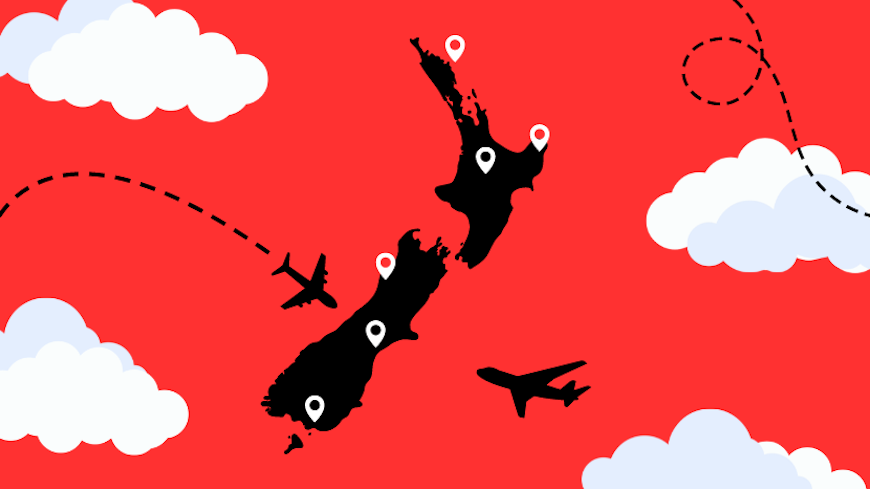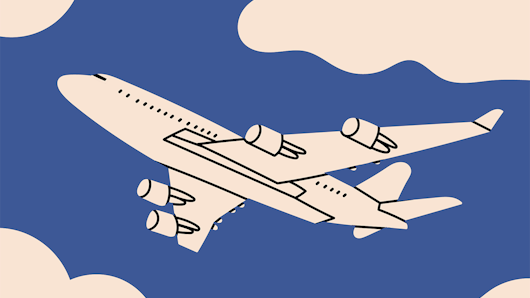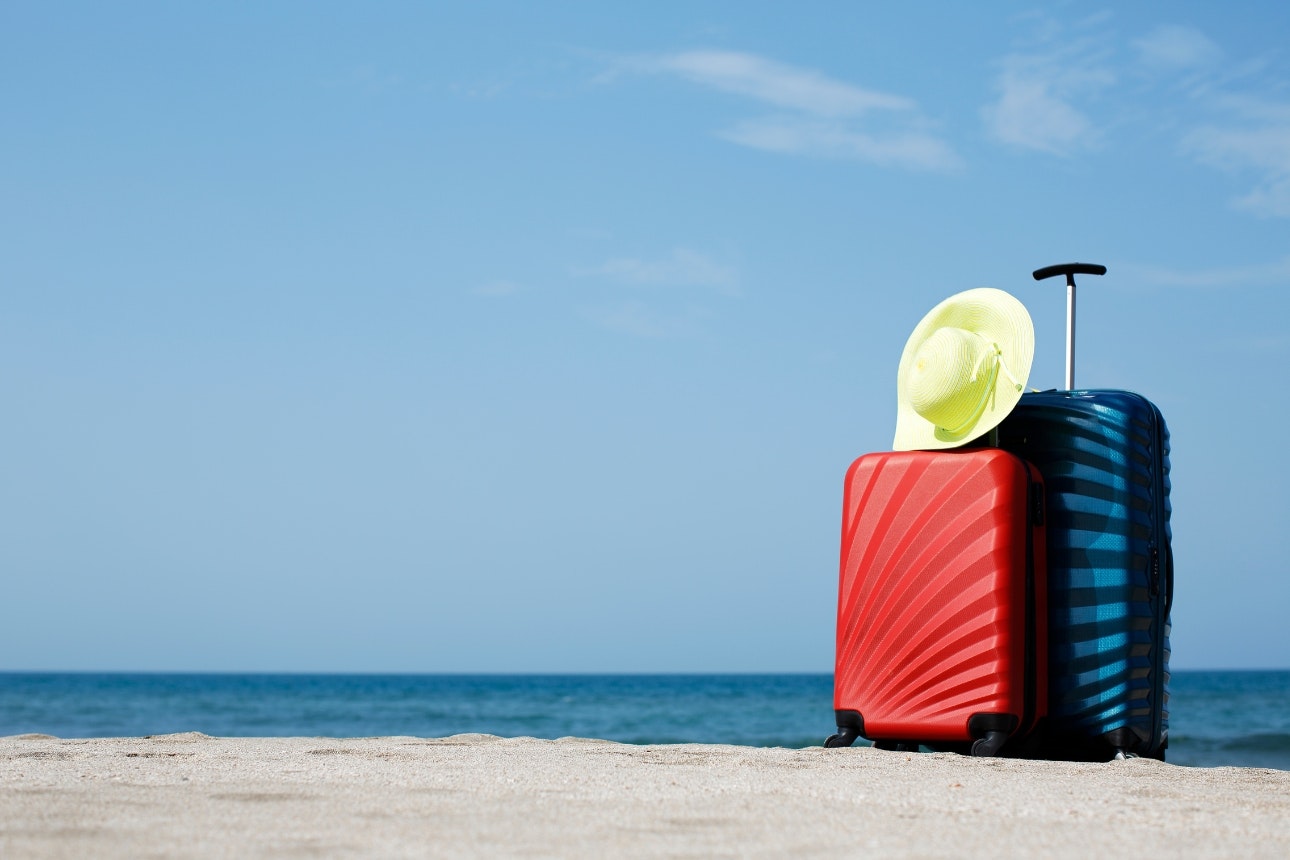
By Vanessa Pratley
Investigative Journalist | Kaipūrongo Whakatewhatewha
This is the third story in a Consumer NZ investigation into New Zealand’s domestic aviation market. Here, we look at how our concentrated market is affecting people in the regions and whether there’s a flight path out of this mess.
The first part in this series looked into why it’s so expensive to fly domestic. The second part shed light on the market share of our biggest airlines, and whether things were looking any better across the ditch.

Declining connectivity and lack of choice is harming regional communities
Joseph* lives in Tauranga with his partner. They moved there 2 years ago and in June 2024, decided they would travel to Invercargill to see their families for the first time in 24 months.
Joseph says Tauranga airport is quite small, and since there were no direct flights to Invercargill, they had to book a layover too. “All the times I’ve flown from Tauranga to Invercargill, I’ve always had to have a layover either in Wellington or Auckland or Christchurch.”
But the layover isn’t the issue.
“The problem is that if you book in advance, you know 4, 5, 6 months in advance then flights can be reasonably cheap. Maximum $200 to $300. But say you’ve got an emergency or it’s a spur of the moment type thing it’s upwards of $600 to $700 dollars [one way] to get it sorted with a layover of potentially 4 hours.”
Joseph says he wanted to see his family, so he only had one choice. Air New Zealand.
“It’s just Air New Zealand, there’s Barrier Air but they’re only flying to the Islands. From Tauranga, you either spend money on flights or you don’t go anywhere at all.”
Joseph reckons it just didn’t feel fair. “I think charging people almost $700 for a regional flight is pretty absurd considering you can go overseas for less.”
When Joseph tried to book his $400 flight home, his partner inadvertently purchased the last available flight at that price.
“It said five or less seats available at that price. So, we knew that there were only a few there, but we didn’t get the impression that there were five or less seats available on the entire flight.
“We went through and picked our seats, put in our card details and pressed enter at the same time. She got the flight, and I had to pay an extra $250 to get on a completely different flight because it was sold out.”
While he doesn’t think this was false advertising, Joseph says the ticketing was problematic.
“Imagine if it was someone going to visit family in hospital, someone who needed that flight more than me, and they couldn’t afford to spend $650 on a flight.”
Hospital visit or not, Joseph says it was the high cost of flying that meant he couldn’t see his family for 18 months.
“I’ve got the time to do it, it is just so expensive to go way down there, and now, after the issue with our flights coming home, there’s so much risk. If I need to get back urgently, I’m worried I won’t be able to do so.”
The high prices mean Joseph doesn’t feel connected to his family anymore. He misses them and is worried he’ll miss out on important family events, or worse, not be there for emergencies.
“I feel really lost.”
He’s not the only one.
Kelly’s* dad had a serious accident in January of 2024. Even though she lived in Brisbane, she wanted to see her father and support her family. She booked a flight to Whangarei where he lived. At the same time, her brother, based in Blenheim, tried to book too.
“It was going to be cheaper or near the same price for me to fly across the ditch than it was for my brother to fly domestically to Whangarei.”
Bree* recently flew to Palmerston North at the last minute. She wanted to be there for the arrival of her new grandchild, and said she had no choice but to pay what was on offer.
“It was a Sunday afternoon, the plane was full, and the flight cost me $450 one way. I just don’t understand why flights are more expensive the closer they get to the date of flying.”
It was a similar story for several other consumers who got in contact with us about the price of flying to the regions.
Data from Consumer’s Sentiment Tracker shows 67% of New Zealanders have changed their flying behaviour in response to the pricing of domestic flights. That percentage is high, but it’s not evenly spread. When looking at the regional breakdown, 91% of people from Hawke’s Bay changed their behaviour compared to 53% of people from Canterbury.
Our regions need competition
Billie Moore, chief executive of the New Zealand Airports Association, thinks we’ve become complacent about our connectivity. She said the lack of connectivity is “concerning for a country like New Zealand where we are extremely dependent on international and domestic aviation for our people, trade and tourism as well as essential medical and emergency services.
“Regional consumers in particular will remember having more travel options in the past. It feels like we’ve gone backwards …We can also see that there is considerable unserved demand around New Zealand. An estimated 22% of travellers in New Zealand are flying indirectly – 155,991 passengers a week.”
Moore said the power imbalance is massive, especially when it comes to regional airports.
Its impact is felt not just on an individual level by consumers like Joseph and Kelly but on a wider, community level.
Francesca Storey, deputy director of Te Tātai Hauora o Hine, National Centre for Women’s Health Research Aotearoa at Victoria University of Wellington, flies with her team on Air New Zealand regularly. She said being in the regions is important but is increasingly costly for her team and the communities they visit.
“Expensive regional fares are challenging but we’re concerned mostly about the impact this is having for the communities. Particularly at constrained times, this expense and lack of connection points to our regional communities and whānau not being valued.”
Kirsten Wise is the mayor of Napier. She said connectivity was essential for Napier’s local economy, not just for visitors but for residents too. However, she indicated concern that the region was being underserved by the airlines currently flying to its local airport, Hawkes Bay Airport. It’s a publicly owned asset and the bulk of the services are offered by Air New Zealand.
“When there's no strong competition within the industry, you do always have to question if you’re getting the best possible service. We know from when Jetstar was flying here from 2015, our annual passenger numbers went through the roof to over 750,000 compared to about 450,000 prior to that.”
Mayor of Nelson Nick Smith emphasised the value competition affords to consumers in Nelson.
“Competitively priced airfares are vital for an isolated region such as Nelson. Not just for tourism but for many niche business operators who rely on being able to get around New Zealand and connect to the world at a fair price.”
Mayor Wise said pricing was also an issue in the Hawkes Bay. “For most people, they wouldn’t actually have a great understanding of what makes up the various components of airfares. If there was more transparency, there would be a better understanding of if what we’re being charged is actually reasonable. Because at the moment, you sort of don’t really know.”
She said that with only one airline servicing the region, consumers must pay what it's charging.
We asked Mayor Wise if Air New Zealand might wish to prevent a new player coming onto the scene.
“I think [Air New Zealand] would always be wanting to try and protect their monopoly situation. That's why it would really need to be quite a combined effort across all the key players for us to try and attract another airline here to the region.”
We reached out to several other regional councils, but many declined to comment on the issue. One regional mayor said the local council, which owned the regional airport, really valued the ongoing support and partnership with Air New Zealand. Air New Zealand was the only airline providing services at the airport, and the council likely relies on Air New Zealand heavily for connectivity and the ongoing operations of the airport.
A path forward for fairer flights
Moore and the New Zealand Airports Association are advocating for an airfare monitoring regime in New Zealand, like the one in Australia that we covered in part 2 of this series.
A monitoring regime would mean information about market share, routes, capacity, performance, costs, profits, and anti-competitive behaviour is public and accessible. The value in this information being transparent and centralised in one place cannot be understated.
Arena Williams, Labour MP for Manurewa and opposition spokesperson for the Commerce and Consumer Affairs portfolio, said New Zealanders deserve a fair deal when it comes to airfares.
"Labour has called for the Transport and Infrastructure Committee to open an inquiry into airfield services and airline competitiveness ... The case for such an inquiry couldn’t be clearer. [It] would have a timely outcome within this parliamentary term, and could include public submissions.”
Williams said the government could also consider a market study.
“The highly concentrated nature of the domestic airline market is also a concern … but [a market study] will be more challenging following [the government’s] decision in its 2024 budget to cut 10 percent of the Commerce Commission’s workforce and $14 million of its funding, partly through slowing down its work on competition issues.”
However, Andrew Bayly, Minister of Commerce and Consumer Affairs said that while market studies are a useful tool, they don’t necessarily result in better prices.
“There have a been a number of studies in recent years – in groceries, fuel, building supplies – and prices have continued to climb. We need to make sure that we get good value for money from the market studies and continue to focus on the root cause of price escalation.”
We deserve competitive markets
Regional New Zealanders have little or no choice when it comes to flying domestic, with Air New Zealand operating a monopoly on several regional routes.
We’re concerned by the highly concentrated nature of our domestic air transport market, and we’re not convinced that consumers are getting the best deal. To ensure consumers aren’t paying more than what’s fair and to keep Aotearoa connected, we’re calling for:
mandated breakdowns of the costs in a ticket at the checkout
disclosure about airlines’ use of dynamic pricing and profits
a market study to give consumers and the industry clarity about the factors impacting on competition, including pricing and price gouging.
*Names changed to protect privacy.

Flight rights campaign
We’re calling for airlines to communicate honestly with passengers about the reason for cancellations and delays, and clearly display their rights.

